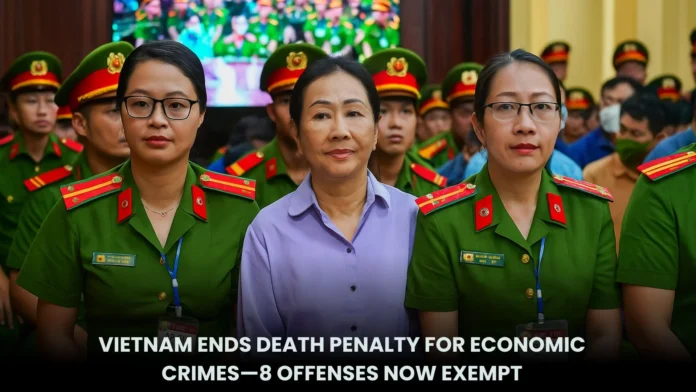Vietnam Ends Death Penalty: A Historic Shift in Vietnam’s Justice System
By officially removing the death sentence for eight offenses—many of which are economic in nature—Vietnam has made a significant step toward reforming its criminal justice system. This decision, effective from July 1, marks a transformative change in how the country handles serious crimes that were once punishable by execution.
Among the most notable aspects of this reform is the commutation of death sentences to life imprisonment for those previously convicted of these offenses. This includes high-profile individuals such as real estate tycoon Truong My Lan, who was sentenced to death in one of the country’s largest financial fraud cases.
This sweeping legislative shift signals Vietnam’s intention to modernize its approach to justice, placing a greater emphasis on rehabilitation, proportionality, and legal reform rather than the finality of capital punishment.
What Has Changed?
In late June, Vietnam’s National Assembly unanimously approved an amendment to the Criminal Code that eliminates the death penalty for the following eight crimes:
- Embezzlement
- Bribery
- Espionage
- Sabotage of state infrastructure
- Attempts to overthrow the government
- Transport or storage of illegal drugs (specific contexts)
- Production and distribution of counterfeit medicine
- Waging aggressive wars or disturbing peace
With this amendment, life imprisonment becomes the maximum sentence for these offenses. The law also applies retroactively to individuals who were sentenced to death before July 1 but had not yet been executed. They will now receive life sentences instead of their original ones.
The Case That Turned Heads: Truong My Lan
The law change has particular significance in the case of Truong My Lan, a prominent Vietnamese real estate mogul. In 2024, she was convicted of embezzling billions of dollars—an amount considered one of the largest financial frauds in Vietnam’s history. Her initial sentence of capital punishment drew global attention.
Under the new legislation, her sentence is automatically reduced to life in prison. Although not officially named in the legislative process, her case underscores the human and political impact of the change. Legal experts have speculated that further reductions in her sentence may be possible if restitution conditions—such as returning a significant portion of embezzled funds—are met.
A Gradual Retreat from Capital Punishment
Over the past few decades, Vietnam has been gradually lowering the number of crimes that qualify for the death penalty. At one time, over 40 offenses were punishable by execution. The number has gradually declined through successive reforms to fewer than a dozen.
With the recent changes, the country now reserves capital punishment for only the most severe crimes. These include:
- Murder
- Terrorism
- Treason
- Rape of children
- Large-scale drug trafficking
This move aligns with broader global trends where many nations are either limiting or eliminating the use of the death penalty, especially for nonviolent or financial offenses. Vietnam’s decision places it closer to international legal standards on human rights and criminal justice reform.
Implications for Inmates and the Justice System
For individuals currently on death row for the now-exempt crimes, the amendment provides an immediate reprieve. Their sentences will be reduced to life imprisonment without the need for court appeals or executive intervention.
This shift also relieves the justice system of the burden associated with capital cases, which often require lengthy appeals, sensitive political oversight, and logistical challenges related to executions. Since 2011, Vietnam has moved from using firing squads to lethal injections—a method that has itself faced criticism for both ethical and practical reasons.
A Turning Point for Legal Philosophy
Vietnam’s latest move reflects a deeper philosophical change: one that favors restorative justice over retribution. By commuting sentences for financial crimes and political offenses, the country opens the door to greater focus on restitution, rehabilitation, and long-term reform.
Critics of the death penalty often argue that executing individuals for nonviolent offenses, such as embezzlement or bribery, undermines the proportionality of justice. By removing these from the list of capital crimes, Vietnam acknowledges that economic harm, while serious, does not warrant the most extreme punishment.
Political and Economic Context
Vietnam has seen a significant number of high-profile corruption cases in recent years as part of its broader anti-graft campaign. The death penalty was often used to signal zero tolerance for corruption at the highest levels. However, this has also led to complex public debates about the fairness, consistency, and morality of such measures.
With the new amendment, the government appears to be balancing strong anti-corruption stances with evolving legal norms and international perception. This measured approach may also boost investor confidence, signaling a more predictable and modern legal environment.
What Comes Next?
Though the death penalty remains in place for certain crimes, this reform sets the stage for continued discussions about the future of capital punishment in Vietnam. Legal scholars and human rights advocates are already calling for broader reviews of the remaining offenses still punishable by death.
Moreover, as life imprisonment replaces execution for a wider range of crimes, the justice system will need to adapt in terms of prison infrastructure, inmate rehabilitation programs, and long-term sentencing policies.
Conclusion
Vietnam’s abolition of the death penalty for eight offenses marks a historic shift in the nation’s legal landscape. It signifies a growing recognition that justice is not always best served by the harshest possible punishments—particularly for financial, political, or nonviolent crimes.
For individuals like Truong My Lan and many others, the change is more than legislative—it is life-altering. And for the Vietnamese legal system, it represents a meaningful step toward a more balanced, reform-minded approach to justice.
The move may also influence neighboring countries to reconsider their own stances on capital punishment, particularly in cases that do not involve direct physical harm. As Vietnam enters this new legal chapter, its actions may serve as a model for progressive justice reform across Southeast Asia and beyond.


